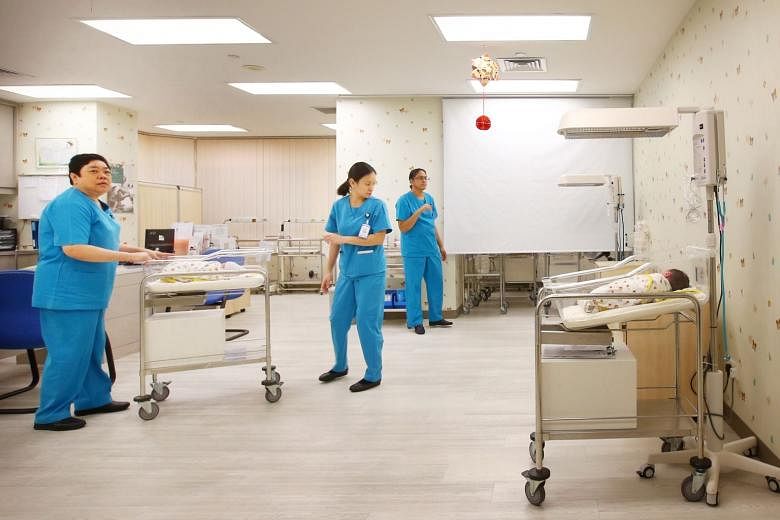SINGAPORE - Raffles Hospital will become the first private hospital in Singapore to say no to sponsorship agreements with formula milk companies and do more to support breastfeeding.
The hospital announced on Thursday (Feb 1) that it will be part of the global Baby-Friendly Hospital Initiative (BFHI) and hopes to be certified baby-friendly by mid-2019. Among the changes it will make are revising its maternity practices to boost staff education and awareness on breastfeeding, restrict ready-to-feed formula to babies with medical requirements only, and ban the dispay of formula milk and feeding bottles at the hospital's retail pharmacy.
Criteria for BFHI certification, which is awarded by the World Health Organisation and Unicef, includes a commitment to 10 steps to encourage breastfeeding, such as facilitating skin-to-skin contact between mother and baby for at least one hour immediately after delivery.
All three public hospitals offering maternity services here - KK Women's and Children's Hospital, National University Hospital and Singapore General Hospital - are BFHI-certified.
Speaking to the media after a tour of Raffles Hospital, Senior Minister of State for Health Amy Khor said the three hospitals have seen a 50 per cent increase in their exclusive breastfeeding rates since attaining certification.
Breastfeeding rates in Singapore are low compared to other developed nations, and more support is needed, she said.
Among the common challenges that hospitals face in meeting certification requirements are resistance by some doctors and mothers to full time rooming-in as well as skin-to-skin contact between mother and child immediately after birth and sponsorships from formula milk companies.
Parents' resistance to such practices often boils down to a lack of awareness and cultural beliefs, Dr Khor said.
"With skin-to-skin (contact) sometimes they may feel room is too cold (for the baby), but doctors who promote this will tell you that the mother is the natural warmer... skin-to-skin takes advantage of the baby's early alertness to naturally latch and promote successful breastfeeding and bonding," said Dr Khor.
Apart from health benefits for both mother and child, breastfeeding also helps parents to save money on formula milk, added Dr Khor.
For those who cannot breastfeed however, more affordable ready-to-feed brands will be available at the public maternity hospitals from July.
The Government has been pushing for all maternity hospitals in Singapore to achieve BFHI certification, following a report by the Competition Commission of Singapore last May that detailed tactics used by formula milk manufacturers, including inducements to private hospitals.
The market inquiry into the rising prices of formula milk here, which have soared to become among the highest in the world, found that manufacturers invest significant marketing resources in hospitals to gain a "first-mover" advantage, as most parents do not switch formula brands later.
To help the private hospitals overcome challenges to attaining BFHI certification, the Ministry of Health and Health Promotion Board have launched a series of initiatives, including a multi-year public education effort to raise awareness of the importance and benefits of breastfeeding.
An online e-learning module on breastfeeding has also been developed for doctors, and will be piloted in March.
Raffles Hospital aims to raise its exclusive breastfeeding rate at discharge from the current 45 per cent to the 75 per cent required for certification, said its chief nurse of inpatient operations, Ms Lilian Yew.
In 2016, exclusive breastfeeding rates for the three BFHI-certified public hospitals ranged from 85 to 93 per cent.
BFHI-certified hospitals are barred from receiving gifts, money, and other forms of support from manufactured or distributors of breast milk substitutes. They must also ensure that no pregnant women, mothers or their families are given marketing materials, samples or gift packs by these manufacturers and distributors.
In response to queries, Mount Alvernia Hospital, Thomson Medical Centre and Parkway Pantai, which Mount Elizabeth, Mount Elizabeth Novena, Gleneagles and Parkway East hospitals are under, said that they are working toward BFHI certification, and already practice some of its steps.
Mount Alvernia, for example, introduced a "newborn dehydration protocol" last year, in which a newborn's weight and passage of urine are monitored throughout the day to ensure that the baby is getting the breastmilk and not at risk of dehydration due to poor latching.
"The more we are able to demonstrate how to do it right to our maternity patients, the more confident they become and are motivated to breastfeed," said a spokesman.
Mr Phua Tien Beng, acting chief executive for Parkway Pantai's Singapore operations division said that its hospitals have been encouraging more parents to room-in with their newborns.
"We have also approached new lower cost milk formula companies and have plans to include them in our milk rotation," said Mr Phua.


